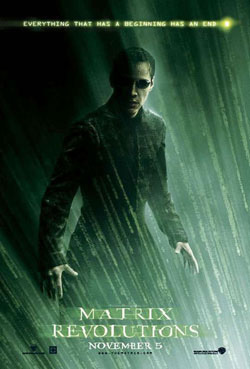|
ASIAN AMERICAN PERSONALITIES
|
CONTACT US
|
ADVERTISING INFO
© 1996-2013 Asian Media Group Inc
No part of the contents of this site may be reproduced without prior written permission.
GOLDSEA | ASIAMS.NET | ASIAN AMERICAN PERSONALITIES
Everydude Uploaded -- The Key to Keanu
PAGE 3 OF 3

The third and final Matrix installment completes the uncanny parallels between the destinies of Neo and Keanu Reeves himself. |
Patric moved with the kids to New York City. Samuel returned to Hawaii. Keanu seems to have been close to his father then, regularly visiting him in Hawaii until the age of thirteen. The visits seem to have ended because of Samuel's run-ins with the law for drug dealing and possession. The most recent was for selling heroin at Hilo airport in 1992. He was convicted in 1994 and sentenced to ten years in prison but was paroled in mid-1996. Father and famous son have never reunited.
In New York Patric met film and stage director Paul Aaron. They married, moved to Toronto and assumed Canadian citizenships (which Keanu holds to this day). The marriage lasted less than a year. Patric had several more relationships before marrying rock promoter Robert Miller who fathered Keanu's half-sister Karina in 1976.
From kindergarten through the eighth grade Keanu attended Toronto's Jesse Ketchum Public School. He wasn't keen on academics but his parents harbored college hopes and enrolled him in a prep school called De La Salle College. His success as goalie on the hockey team earned him the nickname “The Wall” and an MVP award. His main interest was drama. At the age of 17 he dropped out to pursue acting full time while working at a series of part-time jobs like landscaping, sharpening skates at an ice rink and managing a pasta joint at which he was also head pastamaker. He enrolled in the Toronto School for the Performing Arts and started being cast in bit parts on Canadian TV. In 1984 he made his professional stage debut as Wolfboy.
CONTINUED BELOW
Keanu's first big break came in a hockey flick shot in Canada called Youngblood (1986). Reeves played the French-Canadian goalie of a Canadian Junior League team to star Rob Lowe's troubled rookie. Not long after the movie wrapped, Keanu loaded up his aging Volvo and drove to Hollywood armed with $3,000 and the address of stepfather Paul Aaron. At his manager's suggestion Keanu briefly changed his name to K.C. Reeves to avoid being typecast as an exotic. In any event Reeves's consciousness never seemed to have been burdened by questions of his actual ethnic heritage. He has described himself as “a bourgeois, middle-class white boy with an absent father, a strong-willed mother, and two beautiful younger sisters.”
Before long Reeves landed River's Edge (1987), a critically praised coming-of-age drama. His creditable performance opened the door to a series of teen misfit roles. The one that was to leave the most lasting mark was dufus Ted in Bill & Ted's Excellent Adventure (1989), a box office windfall that quickly developed a cult following among the bong-and-brownies set. It established for all time Reeves's bona fides as Everydude. He has yet to live down his remarkable success in capturing the whacked-out mindlessness in which rudderless teen males seek their glory. Every film in which Reeves has starred since has succeeded or failed in direct proportion to the extent he has evoked the Everydude experience.
Over the next decade Reeves took on a string of roles in serious dramas like My Own Private Idaho (1991), Dracula (1992), Much Ado About Nothing (1993), Feeling Minnesota (1996) and The Last Time I Committed Suicide (1997). The most notable exception was Speed (1994) in which Reeves first tapped into his phenomenal appeal as a big-budget action star. Despite the movie's smashing success Reeves declined the inevitable sequel because he didn't like the script. The fact that it bombed has been cited by some writers as evidence of Reeves's acumen in judging the quality of projects. That assessment hasn't been borne out by the tanking of the projects he did take: Johnny Mnemonic (1995) and Chain Reaction (1996). It wasn't until 1999 that Reeves's ship -- actually an armada of three -- would come in with The Matrix and its sequels. As Tom the hacker-aka-Neo the Chosen, Reeves is the ultimate Everydude -- a young mediocrity plugged to a cubicle who finds release and erstwhile glory in virtual reality.
This isn't to suggest that Keanu Reeves hasn't been genuinely appealing in many of those films, as well as in weak but watchable romantic trifles like A Walk in the Clouds (1995) and Sweet November (2001). It's just that the appeal is founded largely on his staggeringly blocked, rudderless brand of charisma, with his effort at acting serving more as an endearing sideshow than an aid to dramatic development. That brings us back to his phenomenal success in the epic role for which he was chosen by the gods of digital entertainment. Like Neo, Reeves has uploaded himself into the virtual realm to lead an epochal change -- in a stylish, fast-paced way, of course, with lots of slo-mo intercuts. And he doesn't even own a computer.
| “He has described himself as ‘a bourgeois, middle-class white boy with an absent father, a strong-willed mother, and two beautiful younger sisters.”’ |
